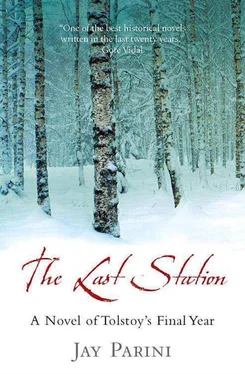Papa’s head sagged. He realized that the situation was unbearable and put a hand on his wife’s shoulder and sighed.
I saw tears on Mama’s cheeks now, a look of unbearable sorrow pooling in her face.
She left that day for home – a merciful gesture on her part – asking her husband to follow in a few days. She wanted them together at Yasnaya Polyana, however, for their forty-eighth wedding anniversary, on the twenty-third of September. He could hardly not agree.
On the morning of the anniversary, Mama came down from her bedroom dressed in a white silk dress, a childlike smile on her face, as if their marriage had been half a century of inexpressible bliss. I confess, she looked radiant. Varvara Mikhailovna and I both complimented her.
‘Tell your father to put on a clean shirt,’ she said. ‘I will ask Bulgakov to take our picture on the front lawn.’
With reluctance, Papa put on a white linen blouse and his best leather boots – ones that he had made himself a couple of years ago and reserves for what he calls ‘state occasions.’ He brushed his hair and beard carefully.
Husband and wife of nearly five decades had a cup of hot chocolate before going outside for the picture. It was a warm day for late September. Though it was not yet noon, the sun burned with an almost lurid brightness, and the heat stood, quivering, on the recently mowed fields – the last cut of the year. Bulgakov was assigned the role of photographer because he supposedly has a knack for it.
Mama thought that a grand, stately photograph of herself and Papa appearing in all the newspapers would put to rest what she called the ‘persistent rumor that there is marital strife between us.’ Papa could hardly refuse to be photographed beside her, since he lets Chertkov take his picture at the slightest whim. I doubt that any man in history has been more photographed than Leo Tolstoy.
I put a screen behind the anniversary couple, as Bulgakov directed. He was being ‘professional.’
‘The screen will concentrate the sun’s rays on the photographic subject,’ Bulgakov said. Varvara Mikhailovna and I giggled behind his back, while Dushan Makovitsky frowned.
Papa squinted into the sun, haggard and distracted.
‘Please try to smile, Leo Nikolayevich,’ Bulgakov said.
Papa forced a meager smile.
Bulgakov put his head under the camera’s black hood, holding the rubber pear to one side. ‘A little to the left, please… There! Now smile…’
Mama, of course, looked like heaven on a dish. She stealthily slipped her arm around her husband’s waist and cocked her head toward his shoulder. She wanted the world to see the Perfect Couple. But nothing would alter Papa’s mood.
The shutter clicked, but when Bulgakov attempted to develop the pictures, two featureless ghosts appeared on the strong-smelling paper. Varvara Mikhailovna said, ‘The camera knows what is really there.’
They tried again the next day, with better results. Afterward, I took Papa aside. ‘You should never have let her talk you into that photograph. It was dishonest.’
‘You are much like your mother,’ he said. ‘Full of anger.’
He should never have spoken to me like that. But I realized his situation made it impossible to behave rationally.
Before lunch, I went in to take his dictation. He was sitting on the couch and looked up like an old spaniel. ‘It’s not your shorthand I need, Sasha. It’s your love.’
Intense love, pity, and sadness rushed from my heels up my spine and broke in a full wave over my head. ‘I need you so, Papa,’ I said, falling to the floor. I wrapped my arms around his knees and wept.
‘What a dear girl,’ he said, stroking my hair. ‘So dear, I love you. So dear…’
The next day Papa put the photographs taken by me and Chertkov back on his study walls. That afternoon, Mama lost her mind.
Varvara and I had been invited to visit a friend for a few nights, and we left after breakfast. That same afternoon, Papa went off into the woods on Delire. When he returned, he discovered that Mama had gone into his study with a cap pistol and fired shots at Chertkov’s pictures before tearing them up – the servants recounted the whole sordid tale in scrupulous detail, as always. When Mama saw Papa in his study, she rushed at him with the same pistol and fired several times at his head before racing back to her room.
Varvara and I were immediately sent for by one of the servants. When we returned, Mama pretended that nothing had happened. ‘You silly girls, what brings you back so quickly? I suppose your hostess was dull.’
I lost my temper. ‘You’re crazy and you’ll kill us all.’
‘Is that what you think?’ She began to enumerate her sufferings, but it was too much for Varvara Mikhailovna to endure.
‘Be still, for once!’ Varvara said.
Mama looked bitterly at my friend. ‘I have tolerated you for a long time, a very long time, Varvara Mikhailovna,’ she said. ‘But I am going to have to ask you to leave us for good. You and Sasha act like tiny children, milling about, pecking and cooing at each other. You disgust me, both of you. The presence of my own daughter I must accept. But you!’ She pointed a crooked finger at Varvara and shook it. ‘I will not have you in my house!’
I wanted to bash her to the floor. Instead, I slammed the door and went to Papa’s study and told him what had happened. He suggested that Varvara and I go to Telyatinki for a few days until Mama’s temper cooled.
Today, before breakfast, I rode off beside Varvara Mikhailovna with a few loosely packed bags and my parrot. Even Chertkov’s company seemed preferable to that of a woman whose entire life was now a sustained note of hatred streaked with self-pity.
LETTER TO GANDHI
KOCHETY, 7 SEPTEMBER 1910
Your journal, Indian Opinion , arrived, and I was delighted to find out that so much has been written there by those who practice nonresistance. I would like to share with you my thoughts upon reading this material.
As I grow older, and now that I feel so vividly the approach of death, I want to tell others about things that move me in a special way. I want to talk about what seems to me of extreme importance, especially what is called nonresistance (but which is really nothing more than the teaching of love unsullied by false interpretations). The fact that love, which is the striving of human souls toward unity and the activity that follows from this striving, is the highest law of human life is sensed by most people in the depths of their souls (we see this most vividly with children) – sensed, that is, until the world snags them in its false teachings. All the great prophets – Indian, Chinese, Jewish, Greek, and Roman – have proclaimed this law. But I think it has been expressed most cogently by Christ, who stated explicitly that the Law and all true prophecies hang on this one supreme law. Having foreseen the possible distortions of this law, Christ pointed out the dangers threatening those who live according to more worldly interests; specifically, he mentioned the danger of letting oneself defend worldly interests by force (that is, returning a blow with a blow, reappropriating by force stolen objects, etcetera). Christ knew, as does any reasonable person, that the use of violence is incompatible with the basic law of love, and that once violence is tolerated, the inadequacy of the law of love reveals itself and repudiates it. Christian civilization, so brilliant on the surface, was founded on this obvious, strange, occasionally conscious but mostly unconscious misunderstanding and contradiction.
In essence, once resistance was allowed to exist side by side with love, love could no longer continue as a fundamental law. The only law that survived was the law of strength – the power of the stronger over the weaker. This is how, for nineteen centuries, Christians have lived. I grant that, at all times, people have mostly been guided by violence as they sought to organize their lives. The only difference between Christian civilization and the others is that Christianity has expressed this contradiction clearly. At the same time, while Christians accept this law, they disregard it in their private lives. Hence, Christians live a contradiction, basing their lives on violence while professing love. This contradiction continued to grow as the Christian world progressed, and it has reached new heights recently. The question now becomes this: either we recognize that we don’t follow any religious or moral teaching and are guided by the power of the strong, or we recognize that all our taxes have been collected by force, and that our institutions (our courts, our police, but – above all – our armies) must be abolished.
Читать дальше












